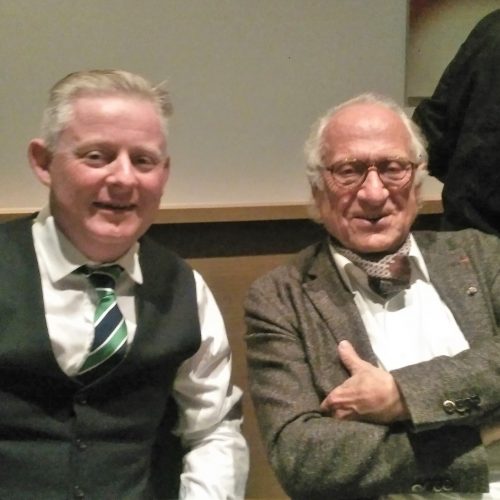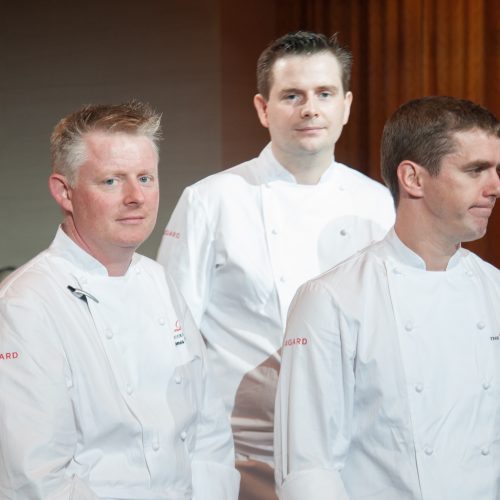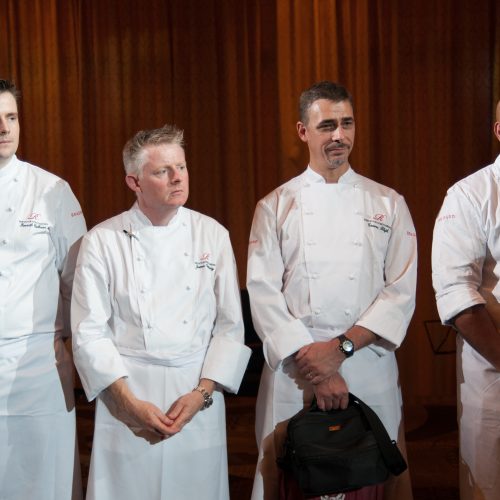1992
James Carberry
“Michel and George corresponded by letter a good few times while arranging my stage. Michel sent me all the letters that went back and forth between them. I think that was a very nice touch. ”
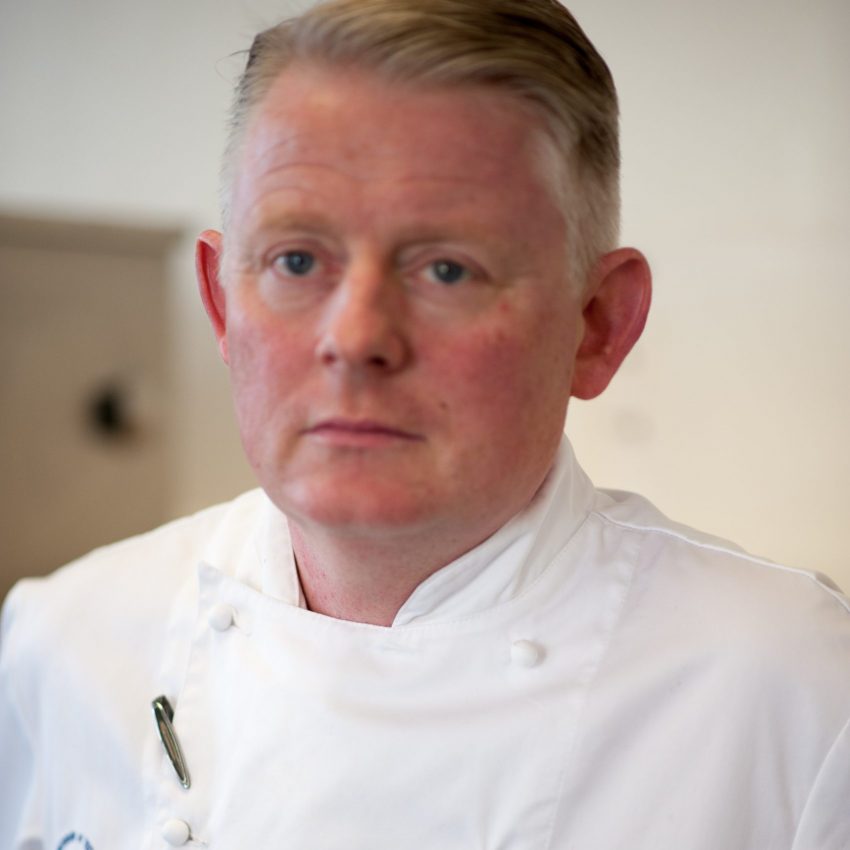
James Carberry won the Roux Scholarship in 1992, at the age of 22. It was his 1st time in the competition. Georges Blanc at Georges Blanc Restaurant, Vonnas, France. He is now a senior lecturer in Culinary Arts, TU Dublin.
Born in Dublin in Ireland, James first wanted to be a chef on leaving school and enrolled into a one-year vocational training programme in hospitality at Crumlin College where he met a teacher called Margaret Buckley, who encouraged him to pursue a career as a chef. Although on starting the course he knew little about food and cooking, by graduation he was named student of the year which helped build his confidence to pursue his place on the coveted professional chefs course at DIT Cathal Brugha Street, the most prestigious training centre for chefs in Ireland, which is known and respected throughout the world for its quality graduates.
James enjoyed his time at Cathal Brugha Street immensely, learning from great lecturers and making friends. While at college, James got a part-time job in a small restaurant where the food was very good and the chef and his team taught him lots of new dishes, showing and letting him taste new ingredients and dishes. The chef also had lots of interesting cookery books which he would share with James, giving him great inspiration that spurred him on. Being at college in the week and working weekends, James' knowledge and skills got better and better.
When he graduated from college, he worked in a few restaurants in Dublin that were noted for serving very good food, as well as a period at Adare Manor. Returning to Dublin, James secured a job at Colin O'Dalys Park Restaurant in Blackrock. At the time Colin was one of the only Irish Chefs who had won a Michelin Star in the Park Hotel Kenmare and he was pushing for recognition again, this time at his own restaurant. Working under the brilliant head chef, John Dunne, who had grown up in the same area as James, the pair got on very well and remain friends now. James says he 'had never been so happy in a kitchen' and got promoted very quickly and was earning good wages at the age of just 20 years old.
From there, James went to be full-time chef at the ESB (Electricity Supply Board) cooking for its fine dining restaurant on the top floor of its Dublin headquarters. It was while working there, he applied for the Roux Scholarship and won.
James has worked at the Technological University of Dublin since 2001, teaching professional cookery both classical and contemporary to full time students from first years to fourth year undergraduates. He is also the year tutor for the first year BSc Culinary Arts students and a consultant and catering expert to industry.
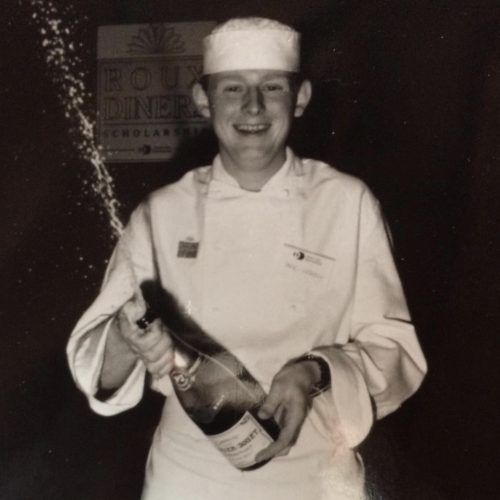
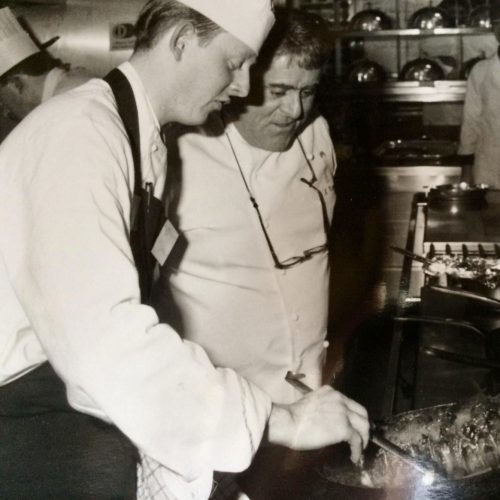
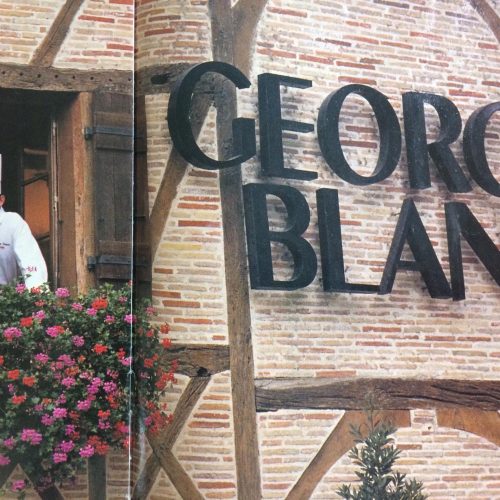
Where did you work when you entered the Roux Scholarship?
I was very fortunate to get a position at the ESB (Electricity Supply Board), I was appointed as a full time member of the ESB which for a chef is quite unusual however the company had a fine dining restaurant on the top floor of its headquarters looking out over Georgian Dublin. I was now running my own little gastronomic kitchen, which out of the 10,000-strong workforce only 20 people, such as the Chairman and Chief Executive, had access. I was now cooking my own dishes and experimenting with new ingredients. Learning from myself and enjoying my new job. It was great! I was now off at the weekends and had a bit of time to think about how I would plan out the next move in my career. The general manager of all catering at ESB Breda Hughes came into the kitchen one day with a grin as big as a Cheshire Cat waving a piece of paper in her hand and said. “You're going to win the Roux Scholarship!” Of course I did not share Breda’s optimism and, in general, I am quite reserved and would never make a statement like that with such confidence. But she believed in me and I sent in an entry. Furthermore, I entered the competition for the paper judging with the absolute backing of the ESB full square behind me. I was then accepted to partake in the regional finals which I was thrilled to get through to and meeting Victor Ceserani and Shaun Hill was fantastic. I enjoyed the regional finals and knew I could cook good food but going to London for the finals a few weeks later was not without pressure. I had a great support network from friends and colleagues and began to prepare for the finals by studying the Guide Culinaire by Escoffier, as I knew classical cooking was what was going to be required on the day in London. When I returned from London after winning the Roux Scholarship I received even more support from the ESB regarding when I would be going on my stage and so on.
Where did you do your stage?
When I won the Roux Scholarship there were not as many three-star Michelin restaurants in the world. All of them were in Europe and concentrated in France. I decided to go to Restaurant George Blanc in Vonnas. This was a well established family business with 200 years of respected tradition to its credit. George had won his third Michelin Star in 1982 and still holds it today. His cooking with the seasons appealed to me and, as you all know, is very much in vogue today. I had a wonderful stage there. It was full on work, six days a week from morning 'til night. I learned so much it was an amazing eye opener to see how a business could become so big and successful. The brigade was almost 50-strong with some incredibly talented chefs running the sections. There was also other restaurants that he owned nearby, a boulangerie and even a charcuterie. All of which I spent time in and learned and observed over my stage. I still have contacts with some of the people I met when there. It was a great pick for my stage. It's interesting now looking back as Michel and George corresponded by letter a good few times while arranging my stage. Michel sent me all the letters that went back and forth between them. I think that was a very nice touch.
What did you cook in the final?
I arrived in London two days before the final to get settled into my hotel. I was feeling good but was nervous as well. Back in those days the final was carried out at the Inn on the Park which was a five-star Four Seasons Hotel, a beautiful property in Mayfair. I was very impressed even to be through the front door. When the finals began, the other competitors and I were briefed as to what was expected of us. We were given the recipe we had to cook. As I have said it was a reference from Escoffier's Guide Culinaire. The dish to be cooked was 'loin de veau a la Cévenole' which is a braised loin of Veal with glazed baby onions, chestnuts puree and a madeira jus. I served pomme Cocotte, turned glazed carrots and a veal Kidney dish of my own creation with the perfectly cooked loin of veal. I was lucky on the day as everything I did worked out well, looked good and tasted good. Even if I had not have won that day I would have been proud of what I served. I enjoyed the final as is was great to meet all the judges. I was a bit awestruck.
How many times did you enter?
I entered the competition only once and won on my first attempt. I put a huge effort into the competition and it paid off.
What do you remember most about the competition the year you won?
It's a bit of a rollercoaster ride when you win. The night of the finals there was a huge party was hosted at the Fours Season Hotel. I got so much attention, people wishing me well, photographers and reporters. When I got back to Dublin everyone at ESB went nuts with excitement. Then I got lots of attention from magazines and newspapers. I was invited on to mainstream radio shows for interviews and so on. It was like being a celebrity, which is not really my thing, but I enjoyed it very much and have a great scrapbook. In that same year I did my stage and I remember talking to Andrew Fairlie on the phone, giving me advice, as he was working in Euro Disney in Paris.
What advice would you give applicants?
If you're going to put in an application for the Roux Scholarship you need to take it seriously and read the literature very carefully. It’s a good idea to get someone to do it with you and go over the requirements as you may miss something important. Remember the competition is in three stages and the first and most important is getting through the paper judging. You must be meticulous with all the content. Your recipe must be written with weights and measures correct; pay attention to spelling; and your explanations of how you carry out the work must be easy to understand. Imagine you are writing a recipe that is going to be published in a cookery book. If you are fortunate enough to get to the regional finals you are now in the frame to be the next Roux Scholar. This is huge so you need to move up a gear in how you are going to prepare for this as you now have to put what you wrote down on paper into a competition winning dish. You must prepare for the cook off. You need to practice you dish lots of times and iron out any tweaks you may have. Also you need to look the part on the day, where a lovely clean uniform and have all your knives sharp and equipment in tip top condition. As for he mystery basket for the dessert. Do something simple with the ingredients you are given. Its so easy to try to hard and make something spectacular and you can't get it over the line in time. If you get to the final I would suggest reading the Guide Culinaire and brushing up on all your cookery techniques.
What is it like to be a Roux Scholar?
At a special dinner one night in Germany while on an educational trip with the Roux Scholarship, Andrew Farlie was making an after-dinner speech. What Andrew said that night I think was true to how I feel about being a Roux Scholar, he said: “It’s a great responsibility being a Roux Scholar as everything you do with your food must be the best you can do, always.” This resonated with me at the time and I had always felt that way from the moment I won the scholarship as I do now. Everything you do as a professional chef and a Roux Scholar should always be your best effort in every way. It’s a great privilege to be a Roux Scholar. Back 1999, Albert and Michel sent me a letter informing me of their intention of forming the Roux Scholars Club. This was the beginning of something very special for all Roux Scholars. I flew to London for a lunch being hosted by Michel Roux Jr at The Gavroche with all the judges there such as Gary Rhodes, Brian Turner, Simon Hopkinson and Rick Stein. Most of the Roux Scholars were there too. It was an amazing experience being able to sit around and chat with all these amazing people. Not long after that, Gary Rhodes hosted another lunch at City Rhodes and I felt like I was getting to know Michel and the other scholars a bit better. As the years went on Michel, organised many educational trips. I have travelled all over the world, learned so many new things and made great friendships along the way. I was very sad and upset to learn of Michel’s passing in March 2020. I will never forget all he has done for me. A great man.
Who are your culinary heroes?
It's is said by some that you should never your heroes but that is not always the case. As a young commis chef, I read a lot of cookery books that I took great inspiration from. One of those books was the Roux Brothers on Patisserie, from which I just loved to try out the recipes. It was very modern and there was so much content and great dishes. So Michel and Albert were a big influence on my cooking along with other books published around that time by chefs like Raymond Blanc, Nico Ladenis and Marco Pierre White. I particularly liked to watch Keith Floyd on TV he was brilliant. Thomas Keller is one of my modern culinary heroes. He is a very important chef who cooks the most amazing food and he has published some fantastic useful work. Keller is an all-round perfect roll model for any chef young or old.
What made you want to become a lecturer?
I very much enjoyed my time at college so in the back of my mind I knew that I wanted to go back to Cathal Brugha Street and be a teacher. I liked the idea of teaching and helping people and felt I had a lot to offer. When I returned from George Blanc I enrolled on the City and Guilds 706/3 Advance Kitchen Larder for a two-year part-time course. This was a stepping stone to teaching as it was a requirement at the time to get in front of professional cookery student. After that I did another two years of on a teacher training programme and then another for years pursuing an B.Sc in Education.
Tell us about your current role?
It's great to work at something you love so being a lecturer at the Technological University of Dublin is a dream come through for me. I am the year tutor for the BA in Culinary Arts and teaching practical professional cookery to all four years of the programme. It’s a very fulfilling job for me and I take great pride in my students and graduates. Every year, I have a new cohort of about 65 first years coming onto the programme so I am kept very busy trying to get them off to a great start. The first graduates of the programme passed out in 2004 and I am so proud of their success. They have excelled in industry and are now helping me out with my current student, so things have come full circle now which gives me and my colleagues a great sense of achievement. Last year two of my graduates were awarded their first Michelin Stars: Keelin Higgs of Variety Jones and Ken Culhane fellow Roux Scholar of the Dysart Petersham. Margaret Roche another brilliant chef is in the final stages of opening her debut restaurant Little Acorn in Baltinglass in County Wicklow. I have been very fortunate in my career as Chef and I have enjoyed the journey along the way. When I started out as a commis more than 30 years ago I would have never imagined how well my career would have unfolded. My time at college was wonderful and as I got older I pursued further education to bolster my chances of advancement. After leaving school I did a further 11 years of study! I worked very hard and tried my best to progress. I was appointed as a full time academic in 1999 which was a massive achievement at my age and I think winning the Roux Scholarship has defined my career. People respect the Roux family and being part of that movement gives you kudos by association which money can not buy.
